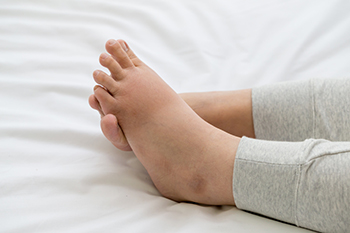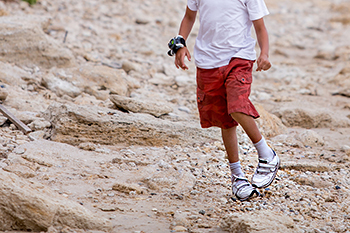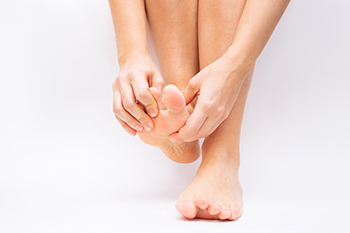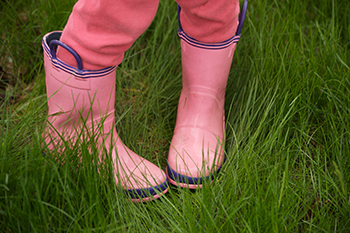December 2023
Common Reasons Why Feet Can Swell

Swollen feet, a frequent and uncomfortable condition, can be triggered by a variety of factors. One of the most common causes is prolonged standing or sitting, which can cause fluid to accumulate in the lower extremities. Similarly, high salt intake can lead to water retention, resulting in swollen feet. Pregnancy is another well-known cause of foot swelling, due to increased blood volume and pressure on leg veins. Certain medications, like those for hypertension or hormone therapy, may contribute to edema. Injuries, such as sprained ankles or fractures, can also result in localized foot swelling. Additionally, underlying medical conditions like heart disease, kidney problems, or venous insufficiency can lead to edema in the feet. Lymphedema, a condition involving impaired lymphatic system function, is another possible cause. Recognizing the common causes of swollen feet is vital, as it can help you determine whether it is a benign issue or a sign of an underlying health problem. If you are concerned about persistent foot swelling, it is suggested that you consult a podiatrist for a proper diagnosis and guidance on managing the condition.
Swollen feet can be a sign of an underlying condition. If you have any concerns, contact one of our podiatrists of Advanced Foot & Ankle Associates, PLLC. Our doctors can provide the care you need to keep you pain-free and on your feet.
Swollen feet are a common ailment among pregnant women and people who stand or sit for extended periods. Aging may increase the possibility of swollen feet and patients who are obese often notice when their feet are swelling too. There may be medical reasons why swollen feet occur:
- Phlebitis - A condition that causes the veins to become inflamed and can also cause leg pain.
- Liver disease - This may lead to low blood levels of albumin which is a protein. This can cause fluid in the blood to pass into the tissues and several areas of the body can become swollen.
- Heart failure - When the heart doesn’t pump properly the blood that is normally pumped back to the heart can pool in the veins of the legs causing swollen feet.
- Kidney disease - One of the main functions of the kidneys is releasing excess fluid in the body. This type of condition can make it difficult for the kidneys to function properly, and as a result the feet may become swollen.
- Deep-vein thrombosis (DVT)- This is a serious condition where blood clots form in the veins of the legs. They can block the return of blood from the legs to the heart which may cause the feet to swell. It is important to be treated by a podiatrist if this condition is present.
Swollen feet can also be caused by bone and tendon conditions, including fractures, arthritis, and tendinitis. Additionally, there may be skin and toenail conditions and an infection may cause the feet to swell. Patients who take medicine to treat high blood pressure may be prone to getting swollen feet.
Many patients elevate their feet to help relieve the swelling and this is generally a temporary remedy. When a podiatrist is consulted the reason behind the swelling can be uncovered and subsequently treated.
If you have any questions please feel free to contact one of our offices located in Lake Worth and Aledo/Willow Park, TX . We offer the newest diagnostic tools and technology to treat your foot and ankle needs.
Birth Defects Impacting a Baby’s Feet

Birth defects affecting the feet can have a significant impact on a child's life. These abnormalities can range from clubfoot, where the foot is twisted inward, to webbed toes or missing toes, irregularly shaped feet, or fused joints. Addressing these issues early is vital for the child's long-term mobility and comfort. Seeing a podiatrist is essential in such cases. Podiatrists are foot specialists who can diagnose and provide early interventions to manage such birth defects. They assess the child's condition, create a tailored treatment plan, and monitor progress. If you have an infant that has been born with a foot deformity, it is strongly suggested that you visit a podiatrist as quickly as possible for an evaluation and treatment plan.
Congenital foot problems require immediate attention to avoid future complications. If you have any concerns, contact one of our podiatrists of Advanced Foot & Ankle Associates, PLLC. Our doctors can provide the care you need to keep you pain-free and on your feet.
Congenital foot problems are deformities affecting the feet, toes, and/or ankles that children are born with. Some of these conditions have a genetic cause while others just happen. Some specific foot ailments that children may be born with include clubfeet, polydactyly/macrodactyly, and cleft foot. There are several other foot anomalies that can occur congenitally. What all of these conditions have in common is that a child may experience difficulty walking or performing everyday activities, as well as trouble finding footwear that fits their foot deformity. Some of these conditions are more serious than others. Consulting with a podiatrist as early as possible will help in properly diagnosing a child’s foot condition while getting the necessary treatment underway.
What are Causes of Congenital Foot Problem?
A congenital foot problem is one that happens to a child at birth. These conditions can be caused by a genetic predisposition, developmental or positional abnormalities during gestation, or with no known cause.
What are Symptoms of Congenital Foot Problems?
Symptoms vary by the congenital condition. Symptoms may consist of the following:
- Clubfoot, where tendons are shortened, bones are shaped differently, and the Achilles tendon is tight, causing the foot to point in and down. It is also possible for the soles of the feet to face each other.
- Polydactyly, which usually consists of a nubbin or small lump of tissue without a bone, a toe that is partially formed but has no joints, or an extra toe.
- Vertical talus, where the talus bone forms in the wrong position causing other bones in the foot to line up improperly, the front of the foot to point up, and the bottom of the foot to stiffen, with no arch, and to curve out.
- Tarsal coalition, when there is an abnormal connection of two or more bones in the foot leading to severe, rigid flatfoot.
- Cleft foot, where there are missing toes, a V-shaped cleft, and other anatomical differences.
- Macrodactyly, when the toes are abnormally large due to overgrowth of the underlying bone or soft tissue.
Treatment and Prevention
While there is nothing one can do to prevent congenital foot problems, raising awareness and receiving neonatal screenings are important. Early detection by taking your child to a podiatrist leads to the best outcome possible.
If you have any questions please feel free to contact one of our offices located in Lake Worth and Aledo/Willow Park, TX . We offer the newest diagnostic tools and technology to treat your foot and ankle needs.
Arthritis in the Toes

Arthritis, a condition commonly associated with joints like the knees, hips, and hands, can also affect the toes, causing pain, swelling, and difficulty in movement. Toe arthritis primarily targets the big toe, but other toes can be affected as well. This condition arises from the wear and tear of toe joint cartilage and inflammation. Symptoms include persistent toe pain, swelling, and inflammation, often accompanied by redness in cases of rheumatoid arthritis and psoriatic arthritis. Osteoarthritis, on the other hand, may lead to bone spur formation, further restricting movement. Other symptoms of toe arthritis include limited range of motion, difficulty and pain in bending the big toe, permanent downward bending of the toe. Increased pain during weight-bearing activities, and deformities like hammer toe, are other factors. If you suffer with toe pain, it is suggested that you make an appointment with a podatrist to see if arthritis is the culprit and get treatment that will relieve discomfort.
Arthritis can be a difficult condition to live with. If you are seeking treatment, contact one of our podiatrists from Advanced Foot & Ankle Associates, PLLC. Our doctors can provide the care you need to keep you pain-free and on your feet.
Arthritic Foot Care
Arthritis is a term that is commonly used to describe joint pain. The condition itself can occur to anyone of any age, race, or gender, and there are over 100 types of it. Nevertheless, arthritis is more commonly found in women compared to men, and it is also more prevalent in those who are overweight. The causes of arthritis vary depending on which type of arthritis you have. Osteoarthritis for example, is often caused by injury, while rheumatoid arthritis is caused by a misdirected immune system.
Symptoms
- Swelling
- Pain
- Stiffness
- Decreased Range of Motion
Arthritic symptoms range in severity, and they may come and go. Some symptoms stay the same for several years but could potentially get worse with time. Severe cases of arthritis can prevent its sufferers from performing daily activities and make walking difficult.
Risk Factors
- Occupation – Occupations requiring repetitive knee movements have been linked to osteoarthritis
- Obesity – Excess weight can contribute to osteoarthritis development
- Infection – Microbial agents can infect the joints and trigger arthritis
- Joint Injuries – Damage to joints may lead to osteoarthritis
- Age – Risk increases with age
- Gender –Most types are more common in women
- Genetics – Arthritis can be hereditary
If you suspect your arthritis is affecting your feet, it is crucial that you see a podiatrist immediately. Your doctor will be able to address your specific case and help you decide which treatment method is best for you.
If you have any questions, please feel free to contact one of our offices located in Lake Worth and Aledo/Willow Park, TX . We offer the newest diagnostic and treatment technologies for all your foot care needs.
Gout Pain Can Be Managed
Treating Your Child’s In-Toeing

Most people's feet typically point straight ahead or outward, but some children develop a condition known as in-toeing, where the feet point inward which is often referred to as pigeon toes. In-toeing is a common phenomenon in young children, and while it often corrects itself with time, some cases require attention and treatment, based on the underlying cause. Internal tibial torsion is one cause of in-toeing, and most doctors refrain from prescribing treatment for young children with this condition. Braces and special shoes are generally ineffective and rarely used due to their expense and children's reluctance to wear them. Surgical correction is only considered in cases where the twist in the tibia is severe and appearance becomes a concern. Excess femoral anteversion, another cause of in-toeing, typically improves on its own as children age. Braces or shoe modifications are generally not effective, and surgery is only considered in very severe cases where the inward twist of the thigh bone is significant. Metatarsus adductus, characterized by a curved foot shape, may involve stretching exercises or the use of casts or braces for more severe cases. Fortunately, any residual curvature post-treatment does not impede a child's ability to run and play, and it is not painful. If your child’s in-toeing seems to be problematic, it is suggested that you schedule an appointment with a podiatrist who can determine what the best treatment is.
Making sure that your children maintain good foot health is very important as they grow. If you have any questions, contact one of our podiatrists of Advanced Foot & Ankle Associates, PLLC. Our doctors can provide the care you need to keep you pain-free and on your feet.
Keeping Children's Feet Healthy
Having healthy feet during childhood can help prevent medical problems later in life, namely in the back and legs. As children grow, their feet require different types of care. Here are some things to consider...
Although babies do not walk yet, it is still very important to take care of their feet.
Avoid putting tight shoes or socks on his or her feet.
Allow the baby to stretch and kick his or her feet to feel comfortable.
As a toddler, kids are now on the move and begin to develop differently. At this age, toddlers are getting a feel for walking, so don’t be alarmed if your toddler is unsteady or ‘walks funny’.
As your child gets older, it is important to teach them how to take care of their feet.
Show them proper hygiene to prevent infections such as fungus.
Be watchful for any pain or injury.
Have all injuries checked by a doctor as soon as possible.
Comfortable, protective shoes should always be worn, especially at play.
If you have any questions please feel free to contact one of our offices located in Lake Worth and Aledo/Willow Park, TX . We offer the newest diagnostic and treatment technologies for all your foot and ankle needs.
Blog Archives
- March 2025
- February 2025
- January 2025
- December 2024
- November 2024
- October 2024
- September 2024
- August 2024
- July 2024
- June 2024
- May 2024
- April 2024
- March 2024
- February 2024
- January 2024
- December 2023
- November 2023
- October 2023
- September 2023
- August 2023
- July 2023
- June 2023
- May 2023
- April 2023
- March 2023
- February 2023
- January 2023
- December 2022
- November 2022
- October 2022
- September 2022
- August 2022
- July 2022
- June 2022
- May 2022
- April 2022
- March 2022
- February 2022
- January 2022
- December 2021
- November 2021
- October 2021
- September 2021
- August 2021
- July 2021
- June 2021
- May 2021
- April 2021
- March 2021
- February 2021
- January 2021
- December 2020
- November 2020
- October 2020
- September 2020
- August 2020
- July 2020
- June 2020
- May 2020
- April 2020
- March 2020
- February 2020
- January 2020
- December 2019
- November 2019
- October 2019
- September 2019
- August 2019
- July 2019
- June 2019
- May 2019
- April 2019
- March 2019
- February 2019
- January 2019
- December 2018
- November 2018
- October 2018





